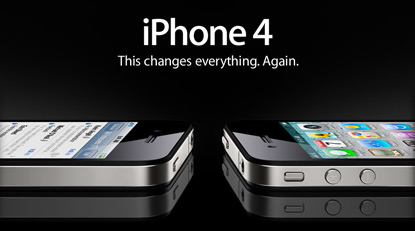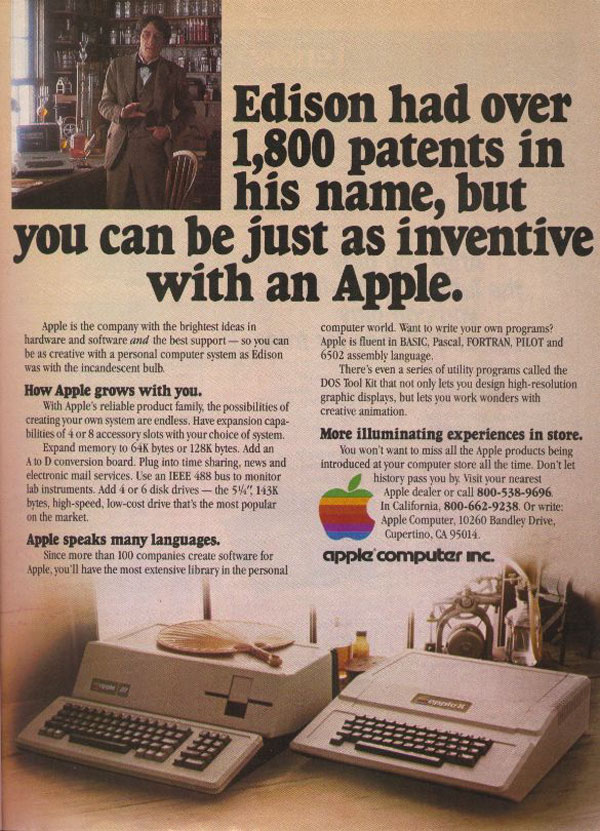Now that yet another Steve Jobs keynote is over, I find myself more interested in what Apple was saying about itself than what others are saying about its new gadgets.
Despite my apparent pique pommaire, I like Apple stuff. I do my computing on a Mac and I have an iPhone and so forth. But as both a user and a developer, I’ve grown frustrated with the rapidness of their updates. In neither role do I want to deal with new operating systems or new devices so frequently. Particularly when the changes and additions are neither incremental nor profound.
As I pondered, I spent some time studying the images of the iPhone 4G on Apple’s homepage. They read, “This changes everything. Again.”

Apple frequently deploys the rhetoric of change in its marketing. The famous 1984 Macintosh ad frames the then-new computer as an agent of revolution. The “Think Different” ads of the 1990s implied that purchasing one of these underdog machines put you in the same company as other misunderstood genius underdogs. But it goes back further than that, too. Ads for the Apple ][ and Apple /// in the early 1980s compared their power to that of famous inventors of ages past, including Henry Ford, Thomas Jefferson, and Ben Franklin, among others.

But the “change” associated with the iPhone 4G is fairly modest compared to the Apple ][, the Macintosh, or even the original iPhone. Sure, it has a new high-resolution display that will likely serve as an important stepping stone to viable handheld and tablet computing of the near future. But that transition is clearly happening already. It has a gyroscope for better motion sensing. But those capabilities just play catch up to the familiar, increasingly pat controls of today’s videogames. It has nicer cameras and more of them. It has better battery life. It’s hardly the printing press or the airplane—or even the personal computer.
So what’s going on? Why is Apple trying to pass off a fairly predictable (and fairly well predicted) gradual evolution of their existing platform as change of the more revolutionary kind? Hyperbole is one possible answer; change has become an idea so synonymous with Apple that it must be perpetuated through its branding and marketing even when “real” change may be lacking. Another might be hubris. In his push to get products done just his way, Steve Jobs has a history of making missteps into evolutionary dead-ends. Just take a look at this print ad for the 1983 Apple Lisa. It uses the same sentence construction as the iPhone 4G spread mentioned above, with use of “Again (full stop)” reminding the buyer that Apple’s got a track record.

But neither of those explanations are complex or subtle enough to capture what I think is going on with Apple’s latest use of the rhetoric of change. The change here is not political or social or industrial, as in the case of 1984 or Henry Ford. Instead, it’s commercial.
For Apple, “change” no longer refers to revolution. It refers to fashion.
With his bi-annual releases of handheld (and now, we can presume, tablet) devices, Steve Jobs is becoming more like Mario Prada and less like Thomas Edison. He’s releasing a new line, seasonally, and needs to train his audience to feel increasingly comfortable dropping hundreds if not thousands of dollars each spring and winter. The “change” in question is not regime change, but a change between tennis at the club and dinner downtown. Jobs’s keynotes are, and for some time have been, more like catwalks than like product demos for some time. The Apple Stores are literally boutiques, not electronics shops. I should have realized it when I called the original iPhone the geek’s chihuahua: Apple now deals in haute couture, not in high tech.
Comments
Jeff Medcalf
It seems they deal in both. Why is it a problem when devices are fashionable? Granted, the iPhone 4 is no revolution; Apple seems to pull off one of those only every 5 years or so, and they still have 2 to go since the last one. But still, I have always seen Apple (and NeXT, and Pixar) as Jobs’ way of saying: let’s make things better, and when we run out of better, let’s make something else.
Ben Abraham
I’m waiting for the hi-tech version of PETA to come out with the equivalent of a ‘FUR IS DEATH’ campaign.
Nick
I like the comparison to fashion (especially in terms of seasons: waiting for “next year’s i_____” is typical), but it seems like once you get to that comparison, you should try taking fashion seriously.
Not that you do this explicitly, but likening things to “fashion” or “haute couture” is a fairly common way to disparage them. What could one say about the productions and negotiations of the fashion industry that might shed light on what Apple is doing? I’m wary of this kind of comparison only because it sounds like a precursor to light culture warfareâ??something that people working in games and new media should be sensitive to as recent/current victims of similar dismissal/disregard.
Ian Bogost
@Jeff
It’s not necessarily a problem. I’m just seeking to understand how Apple’s presenting itself and how it’s being received. As for them dealing in both, I think we’re at a point when high tech is being overturned by fashion, in much the same way that, say, textiles were. More to think about in that regard for sure.
@Ben
But if you go naked, you’ll need to buy a chic accessory to hold that iPhone!
Ian Bogost
@Nick
You got stuck in the spam filter (sorry) or I’d have added this reply to the one above.
Anyway, I reread the article and I don’t think there’s anything implicitly or explicitly disparaging about the fashion-tech comparison, even if I agree that fashion is a common way of effecting disparagement. That critique usually arrives through critiques of conspicuous consumption. But as you point out, it’s worth delving deeper into things, perhaps in a context other than a blog. In this context, I was interested in making an observation without conclusion nor (as much as it’s possible) judgement.
thinksmartgames
But isn’t it ok that their definition of change leans towards hyperbole? I mean, the ad world is filled with 99% BS. Why should Apple act any different?
Maybe because you feel its message is riding the coattails of previous ads whose claims of “change” were legitimate?
I’m probably missing the point. Sorry 🙁
Ian Bogost
Oh, I totally expect hyperbole in ads. But I also think that what “change” has meant for Apple has changed over the years, as it were. It used to refer to doing new things in new ways. Now it refers to getting a new thing.
Jesse F
But…doesn’t the new thing allow you to do new things in new ways? Like, say, do on-the-fly HD video editing of a videophone conversation you just had while walking through Times Square, then upload the finished video through the pearly gates of cyberspace? I seem to recall something like that from the keynote. I’m not able to do that, at least not until Thursday. I don’t follow fashion too closely, but if Mario Prada’s latest line of clothes enables similar upgrades to affordance in their users, I will be at least mildly surprised.
In brief, while I understand that the incentive structure for academia rewards insinuations of false consciousness among the hoi polloi and specious overanalysis of every bit of semiotic flotsam to cross one’s path, it seems that you might want to look for a simpler and less insulting explanation for why people might want to upgrade their iPhone every 18 months or so.
For instance, given that an iPhone owner has already agreed that paying $100 a month to maintain a pocket networked exobrain is a worthwhile expense, and given that the actual device presumably has lost battery life and undergone usual wear-and-tear, please explain why you would _not_ spend an additional $200 or $300 on a brand-new and considerably-improved device, especially given that you get to keep the old one as a backup (or sell it on ebay for almost the same amount to a jailbreaker without a phone plan.)
In short, what exactly is your empirical evidence hereâ??other than the fact that someone with a new product used hype in their advertising, which given the commonsensical definition of information as “a difference that makes a difference,” means that you managed to spend hundreds of words saying literally nothing? I mean, have you noticed that every year electronics get _cheaper_ and _better_, to the point where the iPad someone bought last month probably cost less in real dollars than the Atari 2600 I got for Xmas 1977? And this is in and of itself such a qualitative difference from high fashion as to make your comparison useless except for purposes of pure academic onanism?
Ian Bogost
Jesse,
This is a blog. You were really hoping for science?
There’s no critique of false consciousness here. There’s not even a value judgement about the utility or lack of utility of fashion in this post… just an invitation to consider it as a contributing factor, which I think it clearly is. Prada et al had to get the well-off to want to buy new clothes each season, and more “downmarket” designers had to adopt those principles for the middle classes. Apple’s doing just the same for consumer electronics, and I think that’s a fact worth considering.
I think you’re right that an iPad seems to “do” more than a new shirt, but who’s to say that there aren’t functional improvements in fashion too, over and above their social function? After all, a lot (not all) of the “new features” of Apple’s products are really more like re-tailorings than sweeping changes.
PS – The Atari sold for just more than cost in 1977, its retail price of $199 equalling roughly $699 in today’s dollars. The $499 iPad is reported to cost about $260 to manufacture. In real dollars, that would have been something like paying $80 in 1977 to manufacture an Atari, and selling it for $99, which is roughly the equivalent of $350 in 2009. This is a complex comparison, because Atari sold the VCS at only a small profit, whereas Apple makes most of their profit from hardware sales. So your analogy is somewhat fallacious, but only because it doesn’t compare apples to apples, so to speak. Is that enough empirical evidence for you, brother?